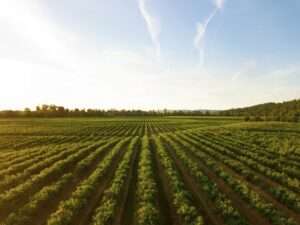LAWRENCE — Five University of Kansas researchers are part of a multi-institutional team awarded a five-year, $12.5 million National Science Foundation grant focused on the restoration of native prairie and agricultural ecosystems, with more than $3 million coming to KU. Collaborators include eight organizations and 26 scientists and educators. KU researchers will focus on native prairie ecosystems and polycultures using the perennial grain Kernza that is under development in collaboration with The Land Institute in Salina.
The KU researchers are Jim Bever, Peggy Schultz, Maggie Wagner, Ben Sikes and Tom McKenna, all scientists at KU’s Kansas Biological Survey & Center for Ecological Research. Bever, Wagner and Sikes are KU faculty members in the Department of Ecology & Evolutionary Biology, and Schultz is a faculty member with the Environmental Studies Program.
The project, based at the Donald Danforth Plant Science Center in St. Louis, establishes the New Roots for Restoration Biology Integration Institute. The overall project will be directed by Allison Miller, a member of the Danforth Center and a professor of biology at St. Louis University.
The research will address natural and agricultural systems in tandem, applying technologies used primarily to study annual grain crops to wild plant species and perennial crop candidate species. The project also will provide opportunities for recruitment, training and placement of new scientists, with a focus on persons excluded because of ethnicity or race, whose research is aimed at restoring wild landscapes and restructuring of agricultural systems for long-term sustainability.
Partner institutions, in addition to KU, are St. Louis University; The Land Institute; the University of Missouri; the Chicago Botanical Garden and the University of Vermont. The research will take place at seven field sites, including the Missouri Botanical Garden’s Shaw Nature Reserve and the University of Kansas Field Station.
Teams within the group will focus on specific themes, including restoration ecology of natural areas, agro-ecology and plant evolutionary genetics.
Researchers from KU and The Land Institute will lead the study of the soil ecosphere. The new grant will extend support for experiments at the KU Field Station testing the effects of plant diversity and drought on plant productivity that were initiated with a five-year NSF Dimensions of Biodiversity grant awarded in 2017.
The new grant also extends collaborations of scientists from KU and The Land Institute, including various studies at the Perennial Agriculture Project Field Station just northwest of Lawrence.
“We want to understand how the soil ecosphere — soil and soil microbes — and the plant community influences above- and belowground variation in plant traits, and vice versa,” said Bever, Foundation Distinguished Professor of Ecology and Evolutionary Biology and the project’s lead researcher at KU. “We’ll look at the question of how these traits influence properties of plant communities and the soil ecosphere.”
The overall project is titled “New Roots for Restoration: Integrating plant traits, communities, and the soil ecosphere to advance restoration of natural and agricultural systems.” The New Roots for Restoration Biology Integration Institute was established with support from the NSF Biology Integration Institutes program, award No. 2120153.
The Kansas Biological Survey & Center for Ecological Research was established at KU in 1911. The center houses a variety of environmental research labs and remote sensing/GIS programs in Takeru Higuchi Hall, Smissman Research Laboratories and the West District greenhouse. The center also manages the 3,700-acre KU Field Station, a site for study in the sciences, arts and humanities.
Home Kansas News Agriculture KU scientists receive $3 million as part of project to restore native...



